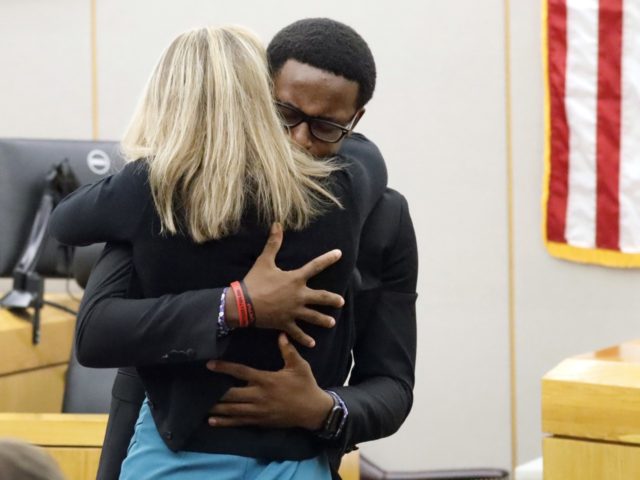This was the week the impeachment of President Donald Trump fell apart, revealed as a cold-blooded plot for partisan vengeance. But that is not what we will remember about it.
We will remember, instead, the extraordinary Christian gesture of 18-year-old Brandt Jean, brother of slain Botham Jean, forgiving former Dallas police officer Amber Guyger for shooting him, asking her to devote her life to Christ, and embracing her in the courtroom.
What a moment in the courtroom, just now. Botham Jean's brother Brandt took the opportunity to forgive Amber Guyger, tell her to devote her life to Christ, and then asked the judge if he could give Guyger a hug.
The judge, wiping tears from her eyes, allowed the moment to happen pic.twitter.com/rxo6sNOwa7
— Mike Leslie (@MikeLeslieWFAA) October 2, 2019
Last year, Guyger was off duty when she entered Botham Jean’s apartment, in what she claimed was a terrible mistake: she thought it was her own. Finding him there, she shot him; he later died. The jury convicted her of murder this week.
Many suspected her of acting out of innate racial prejudice. After the verdict, during the sentencing hearing, prosecutors introduced messages in which Guyger had mocked a Dr. Martin Luther King, Jr Day parade.
Benjamin Crump — the attorney who represented Trayvon Martin’s family in the case that triggered our current decline in race relations — hailed the verdict as “the first time that a white policewoman has ever been convicted of murder of a black man in America.” And perhaps he was right, in that a perceived bias in the system was corrected.
But to protesters outside the courthouse, the ten-year prison sentence handed down to Guyger was too lenient — a new injustice.
A local reporter was stunned at the contrast between Brandt Jean’s act of forgiveness and the familiar attempts to turn Botham Jean’s 2018 death into a further cause for racial division, and political outrage.
“We went from protests outside the courtroom, people yelling, ‘no justice, no peace,’ calling for protests tonight, to Botham Jean’s brother told Amber Guyger he doesn’t want her to go to jail, he loves her and he forgives her,” she observed.
Not everyone was happy with what Brandt Jean had done, especially on the left.
Writer Frederick Joseph said that Brandt Jean had “continued a terrible precedent of Black people not holding white people accountable and that expectation being placed on the community.” Atlantic staff writer Jemele Hill likewise said that Brand Jean’s act of love showed “how black people always are burdened with being the moral compass when it comes to racism.”
What they refused to see was how Brandt Jean transcended all of that, how he looked beyond race and politics and even his bereavement, and found a common moral commitment that would not merely encourage Amber Guyger — facing a decade in prison — to rectify her own life but would also allow him and his family to do so. He re-framed her act of murder as a manifestation of ordinary human fallibility — one that allowed for collective forgiveness.
That is something we, as a society, have almost forgotten how to do. But it is crucial to the Judeo-Christian tradition that is the basis for our republic.
In The Human Condition (1958), Hannah Arendt observed that human society is beset by the problem of unintended consequences. Even actions that have the best intentions can lead to results that cause harm. The victims of that harm can seek retribution, causing further harm — until society itself disintegrates.
We live in such an age now. Speaker of the House Nancy Pelosi literally invokes “prayer” as she seeks to impeach the president for actions that violated no law. Rather than exercising the ordinary power of congressional oversight, as Rep. Fred Upton (R-MI) observed, Pelosi and the Democrats are trying to overturn the last democratic election — a year before the next one.
If they succeed, the result will be division and bitterness that lasts a generation or longer.
There is an antidote, Arendt argued: forgiveness.
“The discoverer of the role of forgiveness in the realm of human affairs was Jesus of Nazareth,” Arendt, a Jewess, wrote.
“Forgiving … acts anew and unexpectedly, unconditioned by the act which provoked it and therefore freeing from its consequences both the one who forgives and the one who is forgiven.”
Forgiveness is an act of individual human liberation that allows society as a whole to survive.
In the Jewish tradition, these are the Ten Days of Repentance, a time for asking, and giving, forgiveness. Jewish law struggles with cases like Jean Botham’s murder. The Bible prescribes internal exile — to the original “sanctuary cities” — for manslaughter. It recognizes that forgiveness lies ultimately with the bereaved family.
Brandt Jean did not, as his critics would have it, concede anything to white supremacy.
Instead, he liberated himself. And America as well.
Joel B. Pollak is Senior Editor-at-Large at Breitbart News. He earned an A.B. in Social Studies and Environmental Science and Public Policy from Harvard College, and a J.D. from Harvard Law School. He is a winner of the 2018 Robert Novak Journalism Alumni Fellowship. He is also the co-author of How Trump Won: The Inside Story of a Revolution, which is available from Regnery. Follow him on Twitter at @joelpollak.

COMMENTS
Please let us know if you're having issues with commenting.